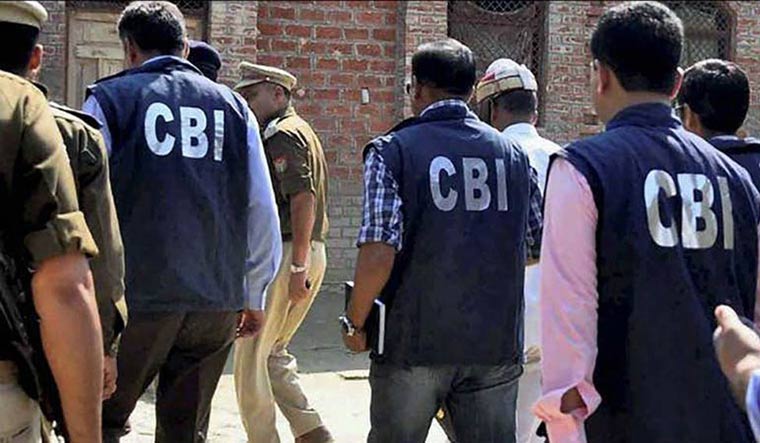The Central Bureau of Investigation has been once again caught in the cross hairs of a political tussle between the Centre and the opposition-ruled states. This time, the biggest impact is on the bank fraud cases with the premier probe agency failing to register around 100 high-value bank fraud cases due to withdrawal of “general consent” by the state governments.
Maharashtra, West Bengal, Rajasthan, Jharkhand, Chhattisgarh and Punjab are some of the states that are blocking the CBI with non-accordance of specific consent under Section 6 of the Delhi Special Police Establishment Act. This withdrawal of general consent by the state governments is making the task of the agency difficult especially in bank fraud cases that require a wide canvas of investigation, said a senior CBI officer. The agency is learnt to have taken up the matter at its highest level.
The latest bank fraud case being probed by the CBI is the ABG Shipyard case where the agency has registered a case against its former chairman and managing director Rishi Kamlesh Sharma and others for allegedly cheating a consortium of banks of over Rs 22842 crore. A Look Out Circular (LOC) has also been issued against the accused to stop them from leaving the country.
While the probe into the ABG Shipyard case might not have suffered a setback so far, the withdrawal of general consent to the CBI for investigating matters within the states' jurisdictions is giving a hard time to the agency's bank frauds division. Sources in the CBI explained that since such cases have a wide canvas of investigation, it requires sleuths to visit those states or at best seek documents and corporation from state police.
CBI officials said the LOC in the ABG Shipyard case had been issued before any of the accused could leave the country. In the past, the agency had faced a huge embarrassment when some of the accused in financial fraud cases like Vijay Mallya and Nirav Modi left the country.
“We are not taking any chances this time,” said an official. “An LOC allows immigration authorities to prevent a person wanted by law enforcement agencies from exiting via airports and border routes.”
The case against the ABG Shipyard and its directors was registered on February 7. On February 12, searches were conducted at 13 locations where, the CBI claimed, several incriminating documents such as books of accounts of the accused borrower company, purchase and sales details, minutes of meetings of the board, share registers and various contract files were recovered. These documents are presently being scrutinised by the agency.
The CBI issued the LOCs after it got the bank account details of the accused and the related parties and found their locations to be within the country. Earlier, the SBI had also opened LOCs against the main accused in 2019.
The CBI began its probe after the SBI made a complaint on August 25, 2020. According to the complaint, the case against ABG Shipyard goes back to 2013 when its account turned NPA. “The NPA is to the tune of Rs 22,842 crore and majority of the disbursement happened between 2005 and 2012 by a consortium of 28 banks led by the ICICI Bank and the SBI,” said a CBI official.
The account was restructured in 2014, but the operations of the company could not be revived. On September 10, 2014, N.V. Dand and Associates was asked to conduct a stock audit of the ABG Shipyard. The audit firm submitted its report in April 2016 and observed various faults on the part the accused company.
Subsequently, the account of the ABG Shipyard was declared NPA on July 30, 2016 with effect from November 30, 2013.
In keeping with a policy implemented since 2014 of red-flagging suspect accounts and commissioning forensic audits by empanelled forensic auditors, a forensic audit was initiated based on the lenders’ decision in the Joint Lenders Meeting on April 10, 2018. Ernst & Young LLP was appointed Forensic Auditor that time.
As per the usual practice, these forensic audits cover a period starting approximately three to four years prior to the date of declaration of NPA, which in this case was 2016, said a CBI official.
The forensic audit of ABG Shipyard therefore covers the period from 2012 to 2017. Meanwhile, the company was also referred to NCLT in Ahmedabad in 2017 by the ICICI Bank for Corporate Insolvency Resolution Process(CIRP).
In between April 2019 and March 2020, various banks of the consortium declared the account of ABG Shipyard as fraud primarily on account of huge transfer by ABG Shipyard to its related parties and subsequently making adjustment entries.
According to CBI sources, it is also alleged that huge investments were made in its overseas subsidiary by diverting the bank loans. Moreover, funds were diverted to purchase huge assets in the name of its related parties. During the initial investigation, it was also seen that the critical period was 2005-2012.
In the ABG shipyard case, there are 28 banks involved in the consortium with a huge amount of disbursement. There were different nature of bank loans including CC Loan, Term Loan, Letter of Credit, Bank Guarantee etc. that were given as advance by the banks. As the CBI probe continues, correspondences are being made with the consortium banks to provide details including documents with regard to sanction of loan and its disbursal. The outcome of the probe hinges on the cooperation from all stakeholders, said an official .





